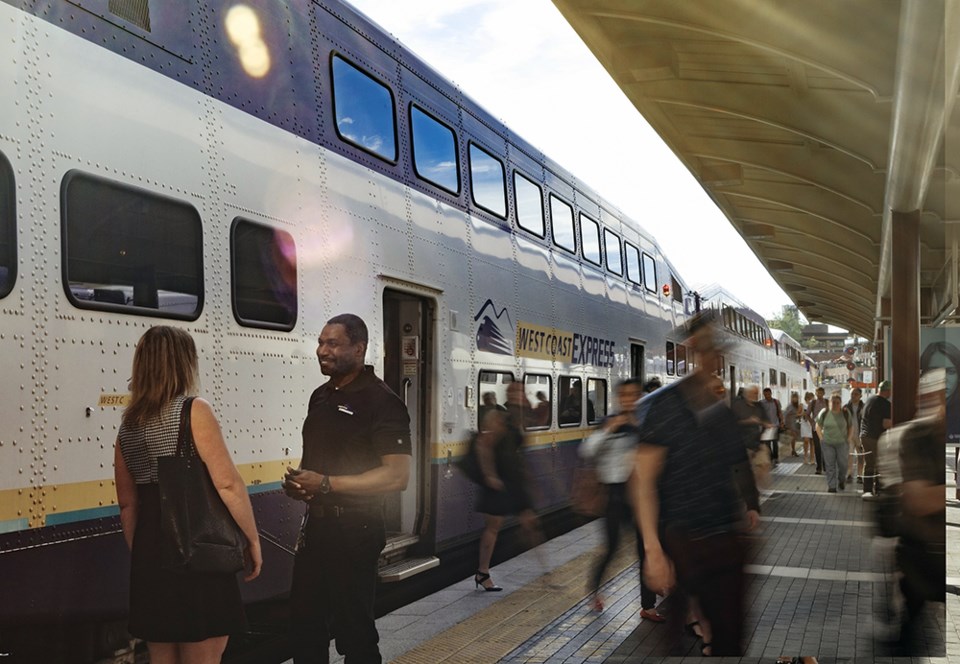New Westminster would be one of the first places to benefit from a high-speed regional rail system, say the proponents of the plan.
Lee Haber, a representative of Mountain Valley Express, said the B.C.-based non-profit society is committed to bringing a world-class regional rail system to the south coast of British Columbia. He said one of the decisive factors when people choose between driving and riding transit is travel time.
“Although our region and province have made significant strides in improving transit in recent decades, one key piece of the transit puzzle is still missing – fast, frequent regional rail service,” he said. “Regions of a similar scale and … are already served with extensive regional rail networks.”
Addressing New Westminster city council at its Aug. 26 meeting, Haber said regional rail would not directly serve New Westminster, but it would significantly reduce congestion and travel times to major regional destinations.
“New Westminster would likely be one of the first places to benefit from regional rail,” he said. “The first phase of regional rail would likely run from Vancouver to Abbotsford, with stations at Surrey Central and Lougheed Town Centre. Regional rail can provide the backbone for future high-speed rail, providing fast and clean transportation to New West.”
Haber said the non-profit recognizes the region has other transit priorities and is not demanding that regional rail move to the front of the line. Instead, he said it is requesting that resources and attention be given to regional rail so key planning issues are resolved years before any shovels are put into the ground.
“Transportation and land use are inextricably linked,” he said. “While recent land use reforms in the form of upzoning have been made to address the housing crisis, without a matching transportation policy shift, we will risk similarly pressing problems in maintaining economic productivity and quality of life on the South Coast.”
Haber said the non-profit society is asking city council to sign its open letter to the Ministry of Transportation infrastructure and to the TransLink board, calling on them to study regional rail and its integration with future rail rapid transit on a variety of corridors. It also calls for the establishment of a directory of properties that should be preserved/monitored to ensure they are designed to accommodate future regional rail rail/rapid transit stations and corridors.
“By signing this open letter, it should not be considered an endorsement of our organization, nor of our vision of regional rail. It's merely supporting the idea of regional rail,” he said.
Haber said the City of Langley has already signed the open letter. In addition to New Westminster, the society has approached Surrey and Coquitlam and has had conversations about the concept with some Vancouver councillors.
Like West Coast Express?
Haber said regional rail is “another level above” what the West Coast Express is in that it would have trains travelling in both directions all day long.
“The technology that we've analyzed, our trains go up to 160 kilometres per hour, have far better acceleration than the diesel locomotives that power West Coast Express. So, you end up with much faster travel times,” he said. “And also, our proposed network would be fully electrified. So, this is another level above both the existing West Coast commuter rail system as well as SkyTrain.”
Haber said SkyTrain is great for urban trips, but it fails when it comes to travelling longer distances and doing inter-regional trips. He said regional rail trains that travel up to 160 kilometres per hour are “much more suitable” for trips such as those from Vancouver to Langley, Abbotsford, or Mission.
West Coast Express transports passengers from Mission to downtown Vancouver during the morning and afternoon rush hours, Monday to Friday. The commuter rail service uses existing railway tracks.
“One of the things we want to do for regional rail is to have reliable, all-day service,” Haber said. “And the only way you really do that is if you have your own dedicated infrastructure.”
Haber said freight companies are concerned about other services that could compromise their operations, and they have every right to be. He said the regional rail system would need its own dedicated infrastructure in order to ensure quality passenger service.
According to Haber, some sections of the regional rail network would run parallel to existing rail corridors, while others would not.
“For many sections of our network, we are not along rail corridors. For instance, most of the section from Surrey to Abbotsford is going to be along the median of Highway 1,” he said. “And if anybody's wondering, we've measured it; even with the proposed Highway 1 widening, there's still enough room for regional rail.”
Taber stressed that regional rail would complement, not replace, other transit plans for the region.
“There are other transit priorities in this region, and we recognize that,” he told council. “It's one of the reasons we as an organization are pursuing models that complement the existing work that is happening in this region in terms of advancing rapid transit. By no means are we looking to displace the other totally valid projects that are happening.”
New West council had a few questions for the delegate, but did not act on the request to sign the letter.
📣 Got an opinion on this story or any others in New Westminster? Send us a letter or email your thoughts or story tips to [email protected].
📲 Want to stay updated on New West news? Sign up for our free daily newsletter.
💬 Words missing in an article? Your adblocker might be preventing hyperlinked text from appearing.



